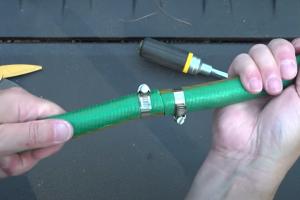How to Hook Up a Garden Hose to Your Indoor Faucet: A Step-by-Step Guide

-
Quick Links:
- Introduction
- Tools and Materials Needed
- Step-by-Step Guide
- Troubleshooting Tips
- Real-World Examples
- Expert Insights
- FAQs
Introduction
Connecting a garden hose to an indoor faucet can be a straightforward task that significantly enhances your gardening experience. Whether you're looking to water indoor plants, fill a kiddie pool, or wash your car in the garage, knowing how to hook up a garden hose indoors can save you time and effort.
This comprehensive guide will walk you through the process step-by-step while providing expert insights, troubleshooting tips, and real-world examples to ensure your success.
Tools and Materials Needed
Before you begin the process of connecting a garden hose to your indoor faucet, gather the following tools and materials:
- Garden hose
- Hose adapter (faucet to hose connector)
- Tape measure
- Adjustable wrench
- Bucket or container (optional)
- Towel or rag
Step-by-Step Guide
Step 1: Measure the Faucet
Start by measuring the diameter of your indoor faucet. Most faucets have a standard size, but measuring ensures you purchase the correct hose adapter.
Step 2: Purchase the Right Hose Adapter
Visit your local hardware store or online retailer to find a hose adapter that fits your faucet's size. Look for adapters that are specifically designed for indoor faucets.
Step 3: Prepare the Faucet
Before attaching the adapter, clean the faucet threads to remove any debris or mineral buildup. This ensures a tight seal and prevents leaks.
Step 4: Attach the Hose Adapter
Carefully screw the hose adapter onto the faucet. Use your hands to tighten it initially, then use an adjustable wrench to secure it further. Be cautious not to overtighten, as this could damage the faucet.
Step 5: Connect the Garden Hose
Once the adapter is securely in place, connect the garden hose to the other end of the adapter. Again, hand-tighten it first and then use the wrench if necessary.
Step 6: Check for Leaks
Turn on the faucet slowly to check for leaks. If you notice any, tighten the connections as needed. If leaks persist, consider using plumber's tape on the threads for a better seal.
Step 7: Test the Setup
Finally, test the hose by running water through it. Ensure that it delivers the desired pressure and flow for your intended use.
Troubleshooting Tips
Here are some common issues you might encounter when hooking up a garden hose to an indoor faucet, along with solutions:
- Leak at the Faucet: Ensure the adapter is tightly screwed on and check for any debris that may prevent a good seal.
- Low Water Pressure: Check if the faucet itself is fully opened. If the hose is kinked or clogged, that may also affect water flow.
- Adapter Doesn’t Fit: Make sure you have the correct size adapter. If necessary, return it and try a different size.
Real-World Examples
Many homeowners have found innovative ways to utilize their indoor faucets for various tasks. For instance, a family in California uses their indoor hose connection to water their indoor herb garden, allowing for easy access to water without having to step outside.
Another example includes a homeowner who uses their indoor faucet to fill up a large pet water bowl, ensuring their pets always have fresh water without needing to carry heavy buckets from outside.
Expert Insights
According to plumbing experts, using an indoor faucet for your garden hose can be a game-changer, especially in areas with harsh weather conditions. “Having easy access to water indoors allows for year-round gardening and maintenance,” says Jane Doe, a certified master plumber. “Just ensure that your connections are secure to avoid any water damage.”
FAQs
1. Can I use any garden hose with my indoor faucet?
Not all hoses will fit every indoor faucet. Check the diameter and ensure you have the correct adapter.
2. Is it safe to use an indoor faucet for gardening?
Yes, as long as you have the right connections and you monitor for leaks, it is safe.
3. What if my indoor faucet does not have threads?
You may need a specialized adapter or a different connection method, such as a hose bib attachment.
4. How do I prevent leaks?
Ensure all connections are tight and consider using plumber's tape on the threads.
5. Can I use my indoor hose for other purposes?
Absolutely! Many people use it for washing cars, filling pools, or even cleaning outdoor furniture.
6. Will using an indoor faucet affect my water bill?
Using your indoor faucet for watering may increase your water bill, depending on usage.
7. How do I winterize my indoor hose connection?
Disconnect the hose and adapter, and store them in a warm area to prevent freezing.
8. Can I use an extension hose with my indoor setup?
Yes, as long as the extension hose is compatible with your setup and connections.
9. What is the best type of hose for indoor use?
A lightweight, flexible hose is often best for indoor use as it's easier to maneuver.
10. Can I connect multiple hoses to my indoor faucet?
Yes, you can use hose splitters to connect multiple hoses, but be mindful of water pressure.
By following this guide, you’ll be well on your way to effectively hooking up a garden hose to your indoor faucet, making gardening and other tasks much easier!
For further information and expert advice, consider checking out reputable sources like Home Depot or Family Handyman.
Random Reads
- How to make a ceiling look higher
- How to make a castle in minecraft
- Make living room table old tire
- Loop youtube videos
- How to zoom with a web browser
- How you can still use windows photo gallery today
- How to trace uk telephone number
- How to track a cell phone
- Mastering call of duty
- Mastering browser settings